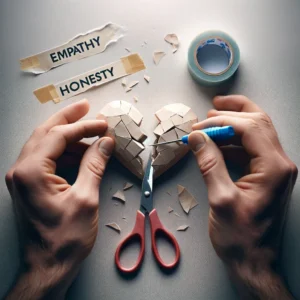Imagine finding out that your partner has been lying to you for months, or even years. How would you feel? How would you react?
Cheating is one of the most devastating things that can happen in a relationship. It shatters the trust and intimacy that you have built with your partner, and it can make you doubt everything you thought you knew.
But how can you tell if your partner is cheating on you? What are the signs that you should look out for? And what can you do to stop the cheating and save your relationship?
In this article, we will answer these questions and more. We will show you how to spot and stop a cheating partner, and how to rebuild your trust and love.
What Does Dishonesty Look Like in a Relationship?
Before identifying signs of dishonesty, it’s helpful to understand what dishonesty means in the context of an intimate relationship.
At its core, dishonesty refers to lying, cheating, or deliberately misleading your partner. It goes beyond little white lies meant to spare someone’s feelings. Dishonesty erodes the foundation of mutual trust and respect that relationships need to stand strong.
Dishonest behaviors can include:
- Lying about your past relationships or romantic history
- Hiding interactions with ex-partners
- Being misleading about your income or financial status
- Flirting with others outside the relationship
- Secret meetups with exes or new romantic prospects
- Engaging in emotional or physical infidelity
When dishonesty is allowed to continue unchecked in a relationship, it enables more harmful behaviors like cheating and destroys intimacy.
How Does Dishonesty Impact Relationships?

Dishonesty has profoundly destructive effects on relationships. Here’s how it tears couples apart:
- Loss of trust: When you catch your partner in repeated lies, it becomes impossible to trust their words or intentions. Everything they say is doubted.
- Diminished intimacy: Openness and vulnerability keep intimacy alive. Dishonesty makes partners retreat behind walls to protect themselves.
- Increased lying: One lie often leads to more lies to cover the first. The web of deception keeps growing.
- Lack of accountability: Dishonest people dodge responsibility for their actions and blame others. This prevents resolving issues.
- Toxic environment: Relationships with dishonesty are filled with negative energy. Partners end up paranoid, suspicious, and walking on eggshells.
The harm caused by dishonesty isn’t always irreparable, but it takes tremendous work to rebuild the broken foundations of trust.
15 Signs Your Partner May Be Acting Dishonestly
Since dishonesty can start small before snowballing, it’s important to recognize even minor red flags when they first surface. Here are 15 subtle signs that indicate your partner may not be trustworthy:
1. They are overly secretive about calls and messages.
Does your partner abruptly end calls or angle their phone away when you enter the room? Do they seem jumpy or evasive when you ask who they’re texting or calling? This kind of secretiveness suggests they have interactions they want to hide.
2. Their explanations about who contacted them don’t add up.
You ask about a mysterious call, and your partner gives vague excuses, saying it’s no one important. But details in their explanation seem fishy. When stories don’t line up, it’s a sign they may be covering something up.
3. They’re cagey about sharing their plans or location.
Everyone needs some personal space in relationships. But consistently avoiding giving details about plans or whereabouts often means they want to conceal that information.
4. They avoid eye contact when discussing certain topics.
Does your partner suddenly seem fascinated by their shoes when you ask about their weekend plans or how their work trip went? This instinctive avoidance of eye contact could betray dishonesty.
5. They offer only vague, high-level answers to your questions.
Ask how their golf game went, and all they say is “fine” without elaborating. Either they don’t want to engage in conversation or are hiding specifics.
6. They constantly make excuses for behaviors.
Your partner has an explanation ready for why they didn’t answer your texts, missed date night, or forgot important conversations. Everyone makes mistakes, but reflexive excuses hint that they are covering something up.
7. They fail to take responsibility for their actions.
Mistakes happen, but dishonest people don’t own up when called out on bad behavior. They deflect blame onto others or justify their actions rather than apologizing.
8. You catch them outright lying about past events.
You know your partner went skiing in college, but suddenly they claim they never learned how to ski. Blatant lies are a neon warning sign about their trustworthiness.
9. They seem nervous or jumpy around you.
Does your partner become anxious when you walk into the house unannounced? Do they whisk their phone away when you glance at it? Jumping to hide harmless things hints at deception.
10. They’re secretive about social media or online activity.
Refusing to accept your follow-up requests or letting you see their messages is dubious. They may worry you’ll uncover dishonest virtual interactions.
11. They hide financial details from you.
Partners shouldn’t have to disclose every dollar spent but actively hiding income, account info, large purchases, or debts can suggest financial dishonesty.
12. They avoid introducing you to important people in their life.
If your partner always has excuses why you can’t meet their best friend, coworkers, or family, they may worry these people will reveal something dishonest.
13. Your partner makes commitments but constantly breaks them.
We all unintentionally break promises sometimes. But if your partner agrees to plans or changes but never follows through, their word can’t be trusted.
14. Friends or family members hint your partner is dishonest.
While an outsider’s criticism isn’t proof, pay attention if multiple people in your partner’s life raise concerns about shady behavior.
15. Your gut tells you something is off.
Sometimes despite a lack of solid proof, your intuition screams that your partner is lying. Listen to those inner red flags that won’t be ignored.
Seeing one or two of these signs occasionally doesn’t necessarily mean your partner is deceitful by nature. But if these behaviors become patterns, it likely indicates dishonesty that shouldn’t be ignored.
How To Have a Productive Conversation About Dishonesty

If you see mounting evidence that your partner is lying or hiding things, it’s crucial to have an open, thoughtful discussion to get to the bottom of it. Avoid angry accusations. Instead:
- Choose a relaxed time to initiate the talk when you’re both calm. Don’t spring it on them the instant your suspicions arise. Wait for a quiet moment when you can have their full attention.
- State directly but kindly what behaviors concern you and why. For example, “It worries me when you won’t share details about where you were last night. That’s not typical for us, so I wanted to understand what’s going on.”
- Ask open-ended questions and truly listen. Give them space to offer explanations without interruptions. Listen with empathy, even if you disagree with what you hear.
- Express how the situation makes you feel using “I” statements. Say, “I feel deeply hurt when I catch you in lies. It makes me unsure about our future together.” Don’t accuse or criticize their character.
- Give them the chance to apologize and commit to rebuilding trust. Deception hurts any relationship, but many can heal if both partners are willing to do the work.
- Consider involving a couples’ counselor if needed. Sometimes a neutral third party’s perspective can help both of you communicate openly and start restoring your bond.
Addressing dishonesty won’t be a painless quick conversation. But in most cases, it’s better to confront issues directly rather than letting deception further corrode your relationship.
Repairing Broken Trust After Dishonesty
Recovering after dishonesty will take consistent effort from both partners, but it is possible. Here are some proactive steps you can take to start rebuilding a trusting relationship:
- The dishonest partner must take full accountability for their actions and understand why they were unacceptable. No finger-pointing or justifying lies.
- Together, talk through what types of dishonesty are intolerable going forward versus harmless white lies that won’t damage your relationship. Get on the same page.
- Comfortable truth-telling will take time. Small daily acts of openness about feelings build back intimacy. Share, listen, and be vulnerable.
- Check in regularly about how you each are feeling as you work to strengthen trust. Name fears or anxieties so they can be addressed.
- When promises are made, follow through reliably. Consistently matching words with actions proves commitment to honesty again.
- Consider counseling to uncover why deception happened in the first place and how both partners can get their needs met without it.
Healing will require much reassurance, affection, and patience from both people. But if both partners value their relationship, trust can grow deep roots once more.
When Is Dishonesty Too Toxic to Continue a Relationship?
Repair attempts after small lies may succeed, but repeated or major dishonesty like hidden affairs often permanently destroys the foundation of a relationship.
If you find yourself in a relationship plagued by deception, watch for these signs it may be beyond saving:
- Your partner continues lying even once dishonesty is exposed. They lie about lying.
- You feel uneasy and insecure constantly, obsessing over what else they might be hiding from you.
- Every word out of their mouth rings false. You automatically doubt whatever they tell you.
- Conversations regularly escalate into angry accusations of dishonesty from both sides.
- Your partner feels entitled to privacy that excludes you and sees no issue with that.
- When confronted, your partner denies wrongdoing, gets defensive, and blames you.
- Attempts to discuss issues related to dishonesty always end up in circular fights.
- Talking feels pointless because your partner dodges uncomfortable topics and pretends problems don’t exist.
- You dread seeing them and avoid being home because the atmosphere is toxic when you’re together.
If this level of deception and destruction has infected your whole relationship dynamic, continuing to try to fix things may only prolong your pain. In some cases, it becomes healthier to let go altogether and start fresh.
How To Know If You Must End the Relationship
Deciding when to call it quits permanently is never easy. Consider whether:
- Your fundamental trust is gone and can’t be recovered. Forgiveness just isn’t possible.
- You’re both miserable more often than not when you’re together. The bad outweighs the good.
- Efforts to communicate constructively or get help from a counselor haven’t improved your dynamic.
- Staying feels like you’re betraying your self-worth and resigning yourself to perpetual dishonesty.
- The relationship has turned verbally or physically abusive alongside the deception.
- Your friends and loved ones uniformly advise that this relationship is toxic for you.
- You are disengaged and going through relationship motions without sincerely working to deepen intimacy and trust.
If those descriptions resonate, letting go of the relationship may be healthiest, despite the initial grief it will bring. Your long-term well-being is most important.
In Closing
Dishonesty casts an awful shadow over relationships when it’s allowed to go unchecked. But the sun can shine again if both people commit to openness. Have courageous conversations, get help when you need it, and trust actions over empty words. With time and dedication, honesty can flourish once more. Most importantly, know your worth and refuse to settle for anything less than you deserve. You’ve got this!

